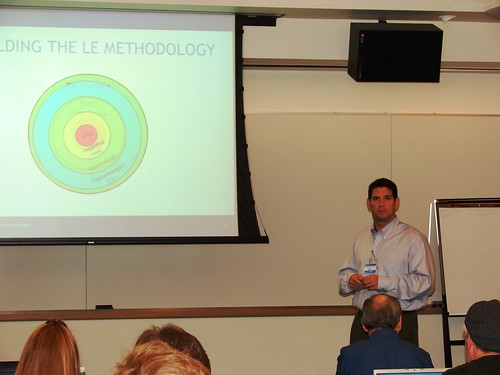LTAC Summit - Morning
 Notes from the LTAC Summit, July 19, 2007 at Microsoft.
Notes from the LTAC Summit, July 19, 2007 at Microsoft.John Falchi: IMS GLC Overview and Role of LTAC: Formal project charters are developed when they are attempting to address a challenge. We started to develop a charter yesterday around the standards for Distance (Flexible) Learning. They focus on the use and accessibility of work product. Practical application: (Challenge) usable, quality digital content availability; (Outcomes) increase faculty productivity, reduce costs, etc.; Possible solutions: IMS Common Cartridge, IMS Tool Interoperability.
Kevin Riley (IMS Senior Strategist for New Activities): Common Cartridge - Benefits: lower integration costs (hooking together tools, content, etc.), greater choice of content, reduces vendor/platform lock-in, greater assessment options, increase flexibility, sharing and reuse. Why will it succeed? 10 years experience in interoperability work, based on the most widely used standards, widely supported even by the platform vendors, easy to implement and flexible.
Ed Mansouri (UCompass Educator) demonstrated a use of common cartridge, something called ENRICH that looked pretty cool. These common cartridges can be run (displayed) even without an LMS. The common cartridge player also has been ported to the iPhone. Using Adobe AIR they have developed a common cartridge that runs on the desktop without the need for an Internet connection. Ed wasn't given much time, but clearly had some cool stuff that we would have liked to see.
Bill Lee (Desire2Learn): Enterprise Services - objective is to improve interoperability between enterprise systems. This goes far beyond the course and tool interoperability, and looks at the other functions that make an LMS an enterprise-level service. For example, they are currently reviewing the LDAP binding feature.
Gloria Pickar (Compass Knowledge Group): Standards for Distance Learning - named changed yesterday to "Standards for Technology-enabled Flexible Learning." The deliverable for this group is an authoritative source of standards that: a) are evidence-based, b) are applicable globally in higher education, c) support student learning outcomes for technology-enabled flexible learning, d) guide the development of better educational technologies.
Next up was a panel presentation of which I was a part. Separate post coming later about that.


Comments